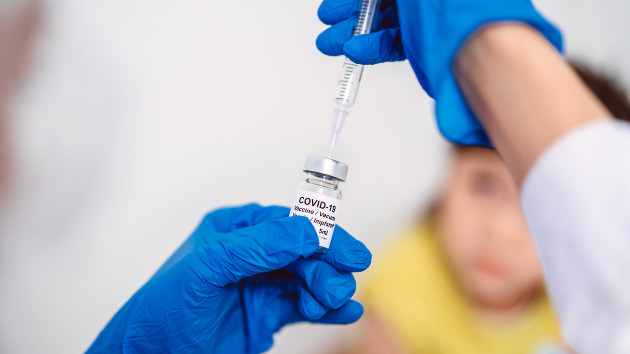(NEW YORK) — COVID-19 vaccine effectiveness against omicron infection fell to less than 20% after six months, according to a new analysis published Wednesday.
Researchers from Italy and the United States looked at some of the most common vaccines used around the world, including Pfizer-BioNTech, Moderna, AstraZeneca and Sinovac.
The researchers, however, did not look at the updated bivalent vaccines that target the original strain of the virus as well as BA.4 and BA.5, which are subvariants of omicron.
For the analysis, published in JAMA Network Open, the team examined 40 studies — a combination of articles and reviews published in peer-reviewed journals and preprints.
After receiving a primary series, protection against symptomatic disease decreased from 52.8% at one month after the last dose to 14.3% at six months to 8.9% at nine months.
When it came to vaccine effectiveness against overall infection, protection fell from 44.4% at one month to 20.7% at six months to 13.4% at nine months.
There were some differences in vaccine products from Pfizer and Moderna; they had higher effectiveness than the AstraZeneca and Sinovac vaccines.
Dr. John Brownstein, an epidemiologist and chief innovation officer at Boston Children’s Hospital who was not involved in the study, said the results are not surprising because researchers have known about waning effectiveness for quite some time.
“However this study provides important insights into the specific effectiveness of the original monovalent vaccines against omicron and highlights the importance of the updated bivalent booster in providing additional protection,” said Brownstein, an ABC News contributor.
Studies from the Centers for Disease Control and Protection show that the updated bivalent boosters enhance levels of protection.
One study found the bivalent booster slashed the risk of visiting an emergency department, urgent care facility or hospital due to COVID-19 by at least half for U.S. adults.
Another showed the bivalent booster provided additional protection against symptomatic infection with the two variants of omicron currently circulating, XBB and XBB.1.5, for at least three months in those who received two to four doses of the original vaccine.
“While effectiveness against infection is an important metric, effectiveness against severe disease, hospitalization and death are crucial metrics when evaluating the overall effectiveness of COVID vaccines, as these outcomes have the most significant impact on public health,” Brownstein said.
The analysis also looked at protection when receiving the original booster dose. Levels of protectiveness increased but eventually waned as well.
Against infection, booster effectiveness fell from 55.4% at one month to 28.9% at nine months. Against symptomatic disease, effectiveness declined from 60.4% at one month to 13.3% at nine months.
Brownstein said it’s important to reiterate that vaccination is still very important — to protect both ourselves and those who are at risk of severe disease — and to not interpret the study to mean vaccines aren’t effective.
As of March 19, the latest date for which CDC data is available, COVID-19 cases were 81.11 per 100,000 among unvaccinated people compared to 26.66 per 100,000 for those vaccinated without the updated booster and 25.81 per 100,000 for those vaccinated with the updated booster.
Death rates as of Feb. 26, similarly, had a large gap with 1.07 per 100,000 deaths for those unvaccinated, 0.21 per 100,000 for those vaccinated without the updated booster and 0.19 per 100,000 for those vaccinated with the updated booster.
“The findings from this study shouldn’t detract from the importance of vaccination,” Brownstien said. “While the effectiveness of vaccines against omicron infection may wane over time, vaccines still provide significant protection against severe disease, hospitalization and death.”
He added, “Additionally, booster doses can help maintain protection against the virus especially when they are more closely matched to circulating variants.
ABC News’ Youri Benadjaoud contributed to this report.
Copyright © 2023, ABC Audio. All rights reserved.












